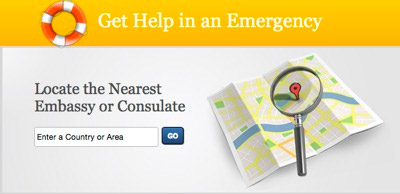Emergencies
SECURITY UPDATE
In the event of an emergency, updates will be posted here as news becomes available to us.
While most students experience a safe and healthy time abroad, some are confronted with various crises petty theft, a minor illness or injury, or with even more serious issues. Of course, students in the U.S. are subject to the same risks, but it’s easier to cope with an emergency — minor or major — in a familiar environment. In a foreign country, where communication and cultural barriers are likely, even a minor crisis can be hard to handle.
What is an emergency?
Students are instructed to contact their local host country coordinator, and SDSU if contacted, when they have a medical or legal emergency, or have been the victim of a crime or natural disaster and are in need of immediate medical assistance or evacuation.
Below are some examples of an emergency:
- immediate physical harm
- dangerous living situation
- significant social unrest
Enroll in STEP

All SDSU global education students are required to register in the U.S. Department of State Smart Traveler Enrollment Program (STEP).
Why? STEP helps the U.S. embassy contact you in an emergency, whether you lose your passport, suffer a minor injury, or find yourself in the midst of a natural disaster. The travel and contact information you provide in the STEP will also help your femily and friends get in touch with you in case of emergency — including situations where family or friends in the U.S. need to contact you with important news. Find information about enrolling in STEP.
Learn what the U.S. State Department can and can't do for you in a crisis situation.
What to do in case of an emergency abroad
It is important to familiarize yourself with these resources upon your arrival in the host country (or even before), so that you can get help quickly. If you are impacted by an emergency, follow these steps:
- Get immediate help. Know the local equivalent of 911 so that you can get immediate emergency assistance. Find the equivalent of 911 in your host country.
- Notify your on-site contact (faculty director, host institution or program provider emergency contact).
- Contact your insurance provider.
- Contact the Global Education Office. During regular business hours (Monday - Friday, 9:00 am - 4:00 pm PST), you can reach us at +1 (619) 594-2475. You can also call the SDSU Police Department collect at +1 (619) 594-1991 (24 hours a day, 7 days a week) to report an emergency and/or request assistance from the Global Education Office. Provide the dispatcher who takes your call with all relevant information. The dispatcher will notify a Global Education Office staff member who can assist you.
- Contact the nearest U.S. Embassy or Consulate and let them know you are enrolled in STEP. Staff abroad are available 24 hours a day, 7 days a week to provide emergency help to U.S. citizens. You can also call the Office of Overseas Citizen Services in the State Department’s Bureau of Consular Affairs for emergency assistance at +1 (202) 501-4444.
- Contact your family and/or friends. If you are involved in an emergency, it is important for you to remain in contact with them. They will be concerned and anxious to hear regular updates from you. Note that the nature and amount of information the Study Abroad Office may disclose to your parents (and/or designated emergency contacts) is limited. It is best for them to communicate directly with you.

